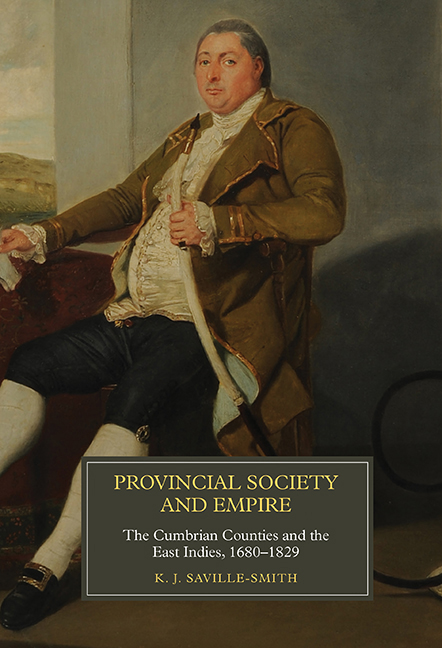Book contents
- Frontmatter
- Contents
- List of Illustrations
- Acknowledgements
- List of Abbreviations
- Glossary
- Chapter 1 The Provincial World and Global Encounters
- Chapter 2 Cumbrian Contexts, Patterns and Lives
- Chapter 3 Why Go to the East Indies?
- Chapter 4 ‘Passage to India’
- Chapter 5 Returning and Returns
- Chapter 6 Conclusion: ‘Use of Globes’
- Appendix A East Indies Enumerated Cumbrian Men
- Appendix B East Indies Enumerated Cumbrian Women
- Appendix C East Indies Women, Associated Cumbrian Men and Their Children
- Appendix D Hudleston, Kin Connections and the East Indies
- Appendix E East Indies connections of the Winders, Stephensons and Fawcetts
- Appendix F East Indies connections of the Braddylls, Wilsons and Gales
- Appendix G Kin Connections of Catherine Holme
- Appendix H Kin Connections of Thomas Cust
- Bibliography
- Index
- Miscellaneous Endmatter
Chapter 3 - Why Go to the East Indies?
Published online by Cambridge University Press: 18 April 2018
- Frontmatter
- Contents
- List of Illustrations
- Acknowledgements
- List of Abbreviations
- Glossary
- Chapter 1 The Provincial World and Global Encounters
- Chapter 2 Cumbrian Contexts, Patterns and Lives
- Chapter 3 Why Go to the East Indies?
- Chapter 4 ‘Passage to India’
- Chapter 5 Returning and Returns
- Chapter 6 Conclusion: ‘Use of Globes’
- Appendix A East Indies Enumerated Cumbrian Men
- Appendix B East Indies Enumerated Cumbrian Women
- Appendix C East Indies Women, Associated Cumbrian Men and Their Children
- Appendix D Hudleston, Kin Connections and the East Indies
- Appendix E East Indies connections of the Winders, Stephensons and Fawcetts
- Appendix F East Indies connections of the Braddylls, Wilsons and Gales
- Appendix G Kin Connections of Catherine Holme
- Appendix H Kin Connections of Thomas Cust
- Bibliography
- Index
- Miscellaneous Endmatter
Summary
In 1783, Edmund Burke thundered:
In India, all the vices operate by which sudden fortune is acquired… Arrived in England, the destroyers of the nobility and gentry of a whole kingdom will find the best company in this nation… Here the manufacturer and the husbandman will bless the… hand that in India has torn the cloth from the loom, or wrested the scanty portion of rice and salt from the peasants of Bengal, or wrung from him the very opium… They marry into your families; they enter into your estates by loans; they raise their value by demand; they cherish and protect your relations which lie heavy in your patronage.
It was a speech that brought together themes developed over three decades of pejorative discourse about the East Indies and those who ventured there from the British Isles. The men and women who went to the East Indies and returned were portrayed as venal, uncouth nabobs and nabobinas. They were depicted as disconnected from the moral restraints of polite society and corrupted culturally with wealth unnaturally acquired. They were the stuff of satire in pamphlet, picture and play. At best they were ridiculous in their pretentions. At worst, they were disruptors of the rightful order, displacers of the landed gentry and debasers of the middling ranks.
No doubt the vociferousness of that public discourse persuaded some that a career in the East Indies was to be avoided. But that same discourse also conveyed and reinforced another motif which served to encourage rather than dissuade; that of the East Indies as a place of abundant opportunities for the acquisition of wealth. Certainly, there appears to have been no appreciable difference in the propensity of Cumbrians to seek success in the East Indies. Prior to Burke's speech in 1783, around 129 Cumbrian men are known to have been appointed or licensed to the East Indies. At least a further 241 Cumbrian were appointed or licensed from 1783 to 1829. Nevertheless, the deep ambivalence evident in the British Isles about East Indies ventures cannot be ignored. It shaped the Cumbrian encounter with the East Indies. The way in which Cumbrians expressed and managed the ambivalences around the East Indies encounter demonstrates the nuanced and contingent nature of success.
- Type
- Chapter
- Information
- Provincial Society and EmpireThe Cumbrian Counties and the East Indies, 1680–1829, pp. 67 - 96Publisher: Boydell & BrewerPrint publication year: 2018



